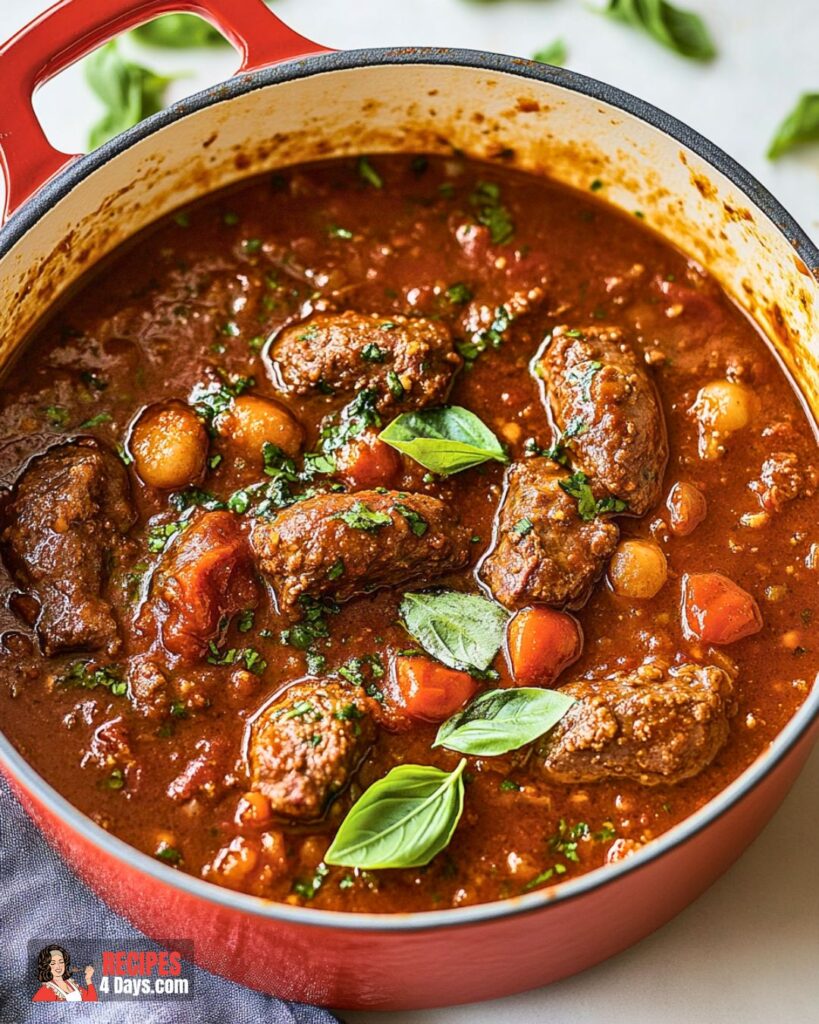There’s something almost magical about the smell of a slow-cooked Italian Sunday Sauce simmering away in the kitchen. The aroma wafts through the house, inviting everyone to gather around the table, sharing laughter, stories, and of course, a hearty meal. For me, this recipe isn’t just about food—it’s a treasured tradition that brings me back to my grandmother’s kitchen in the heart of Italy.
Every Sunday, without fail, my grandmother would rise early to start her sauce. She always insisted that a good sauce needed time, and you could never rush perfection. I remember as a child, waking up to the rich, savory scent of tomatoes, garlic, and fresh basil filling the air. My siblings and I would eagerly hover around the stove, sneaking tastes whenever she wasn’t looking, knowing full well that we’d get a playful scolding, followed by a smile. It was in that cozy, bustling kitchen that I learned the art of making the perfect sauce—a sauce that, to this day, I recreate whenever I want to feel close to those cherished family moments.
But this recipe isn’t just a carbon copy of my grandmother’s sauce; it’s a love letter to the memories we shared. Over the years, I’ve tweaked and adjusted it, adding my own touch, like using both beef chuck roast and Italian sausage for a deeper, richer flavor. The long, slow simmer ensures that the meat becomes melt-in-your-mouth tender, absorbing all the robust flavors of the sauce. And those San Marzano tomatoes? They’re a must—sweet, plump, and full of flavor, just like Nonna used to use.
This Italian Sunday Sauce is more than just a meal; it’s an experience. It’s about taking the time to cook with love and care, knowing that every stir of the pot brings you closer to something truly special. It’s about gathering the people you love and creating new memories around a table filled with good food and even better company. Whether you’re serving it over a pile of spaghetti or ladling it generously over crusty bread, this sauce is bound to bring warmth to your home and smiles to the faces around your table.
So, the next time you’re looking to create a little magic in your kitchen, try this recipe. Let the sauce simmer while you savor the process, and in a few hours, you’ll have a dish that’s not just delicious but steeped in tradition, love, and maybe even a little bit of nostalgia.
Preparing Italian Sunday Sauce
Click here to get printable version
Ingredients
- 2 pounds boneless beef chuck roast
- 4 tablespoons olive oil, divided
- 1 pound Italian sausage links (sweet or hot, uncooked)
- 5 cloves garlic, minced
- 3 to 4 large sprigs fresh basil
- 3 tablespoons tomato paste
- 2 cans (28 ounces each) whole peeled tomatoes (preferably San Marzano)
- 1 1/2 teaspoons kosher salt (adjust to taste)
- 1 teaspoon granulated sugar (adjust to taste)
- 1/4 teaspoon freshly ground black pepper (adjust to taste)
- Cooked spaghetti, for serving
Directions
- Cut the beef chuck roast into four large pieces. Heat 1 tablespoon of olive oil in a large, heavy-bottomed pot over medium-high heat until shimmering. Sear the beef on all sides until well browned, about 8 to 10 minutes. Remove the beef and set it aside on a plate.
- Reduce the heat to medium and add another tablespoon of olive oil to the pot. Brown the Italian sausage links on all sides, turning occasionally, for about 5 minutes. Remove the sausages and place them with the beef.
- Take the pot off the heat and let it cool slightly for about 2 minutes. Meanwhile, finely chop the garlic and remove the basil leaves from the sprigs.
- Return the pot to medium heat, add the remaining 2 tablespoons of olive oil, and heat until shimmering. Add the minced garlic and sauté, stirring frequently, until it turns light golden-brown, about 1 minute. Stir in the tomato paste and cook until the paste darkens in color, about 1 minute.
- Pour in the whole peeled tomatoes along with their juices. Fill one of the empty tomato cans halfway with water and add it to the pot. Break up the tomatoes using a wooden spoon or potato masher. Stir in the basil leaves, kosher salt, granulated sugar, and black pepper.
- Bring the sauce to a simmer over medium-high heat. Once simmering, return the seared beef and browned sausages (along with any juices) to the pot. Lower the heat to low, partially cover the pot, and simmer gently for 3 1/2 to 4 hours, stirring occasionally, until the beef is tender and easily shreds with a fork.
- Once the meat is cooked, remove it from the pot. Shred the beef into bite-sized pieces and slice the sausages diagonally. Return both to the sauce, or serve the meat whole on a platter alongside the sauce and cooked spaghetti.
- Taste the sauce and adjust the seasoning with more salt, pepper, or sugar as needed. Serve the rich, flavorful sauce over a bed of cooked spaghetti.
Storing Suggestion
Store any leftover sauce in an airtight container in the refrigerator for up to 3 days. The flavors will deepen with time, making the sauce even more delicious. For longer storage, freeze the sauce in a freezer-safe container for up to 3 months. Thaw in the refrigerator before reheating on the stove.
Cooking Tips
If you prefer a smoother sauce, use an immersion blender to partially puree the sauce before adding the meat back in. Additionally, consider using a combination of sweet and hot Italian sausages to balance the flavors.
Serving Suggestions
This hearty sauce pairs perfectly with spaghetti, but you can also serve it over polenta or mashed potatoes. Garnish with freshly grated Parmesan cheese and a sprinkle of chopped basil for an extra touch of flavor. A crisp green salad and a glass of red wine make excellent accompaniments.
Ingredient Substitutions
If you don’t have beef chuck roast, you can substitute it with pork shoulder for a different yet equally rich flavor. For a lighter version, try using ground turkey or chicken sausages instead of pork sausages.
Seasonal Variations
In the summer, add fresh diced tomatoes and a splash of red wine for a brighter, lighter sauce. During winter, incorporate a pinch of cinnamon and a bay leaf for a deeper, warming flavor.
Allergen Information
This recipe contains no common allergens if made as directed. If serving guests with gluten sensitivities, be sure to use gluten-free pasta. Additionally, check that the sausages used are free from any allergens, such as dairy or soy.
FAQ:
How can I make this sauce spicier?
To add more heat, use hot Italian sausages and increase the amount of black pepper. You can also add a pinch of red pepper flakes to the garlic and tomato paste mixture.
Can I use canned crushed tomatoes instead of whole peeled tomatoes?
Yes, canned crushed tomatoes can be used for a smoother texture. However, whole peeled tomatoes give you more control over the texture of the sauce.
What can I do with leftover sauce?
Leftover sauce can be used as a base for other dishes, such as lasagna, baked ziti, or even as a topping for pizza. It also freezes well for future meals.
How can I reduce the cooking time?
If you’re short on time, you can cook the sauce in a pressure cooker or instant pot. It will take about 1 1/2 to 2 hours instead of 4.
Can I make this sauce ahead of time?
Yes, this sauce is even better the next day. Make it a day ahead, store it in the fridge, and reheat it gently before serving.
What type of pasta works best with this sauce?
While spaghetti is traditional, this sauce also pairs well with rigatoni, penne, or pappardelle, which can hold up to the hearty meat and sauce.

Italian sunday sauce
Ingredients
- 2 pounds beef chuck roast boneless
- 4 tablespoons olive oil separated
- 1 pound Italian sausage links sweet or hot, uncooked
- 5 cloves garlic minced
- 3 to 4 large sprigs basil fresh
- 3 tablespoons tomato paste
- 2 cans 28-ounce each whole peeled tomatoes, preferably San Marzano
- 1 1/2 teaspoons kosher salt adjust to taste
- 1 teaspoon granulated sugar adjust to taste
- 1/4 teaspoon black pepper freshly ground, adjust to taste
- Spaghetti cooked, for serving
Instructions
- Cut the beef chuck roast into four pieces. Heat 1 tablespoon of olive oil in a large, heavy-bottomed pot over medium-high heat until it shimmers. Add the beef chunks and sear until browned on all sides, about 8 to 10 minutes. Remove and place on a plate.
- Lower the heat to medium. Add 1 tablespoon of olive oil and the Italian sausage links to the pot. Cook, turning occasionally, until browned all over, about 5 minutes. Transfer the sausage to the plate with the beef.
- Remove the pot from the heat and let it cool for about 2 minutes. Meanwhile, finely chop the garlic and remove the leaves from the basil sprigs.
- Return the pot to medium heat, add the remaining 2 tablespoons of olive oil, and heat until shimmering. Add the garlic and cook, stirring frequently, until it turns light golden-brown, about 1 minute. Stir in the tomato paste and cook, stirring constantly, until the paste deepens in color, about 1 minute.
- Add the whole peeled tomatoes with their juices to the pot. Fill one of the empty tomato cans halfway with water and add it to the pot. Break up the tomatoes using a wooden spoon or potato masher. Add the basil leaves, then season with kosher salt, granulated sugar, and black pepper.
- Increase the heat to medium-high and bring the sauce to a rapid simmer. Return the beef and sausages, along with any juices, to the pot. Lower the heat to low and partially cover. Simmer gently, stirring occasionally, until the beef is tender and shreds easily, 3 1/2 to 4 hours.
- Remove the beef and sausages to a cutting board. Shred the beef into bite-sized pieces and slice the sausages thickly on a diagonal. Return both to the sauce. Alternatively, serve the meat whole on a platter alongside the sauce and pasta.
- Adjust the seasoning with additional salt, pepper, and granulated sugar if needed. Serve the sauce over cooked spaghetti.

